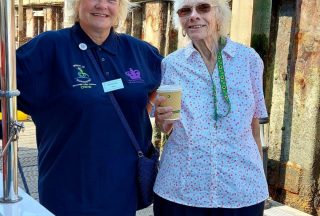It’s important to have a plan in place to help the person you care for in an emergency. This could be in case you experience a sudden illness or accident, or if you are delayed in getting to them.
Having a plan in place can help ease your worries if you’re not able to care for the person you look after at any point in the future. Make sure you let your emergency contacts know where to find the information and keep their contacts handy so you or someone else can get in touch with them.
It’s a good idea to put together details and keep them in one place. This should include:
- The name and address and any other contact details of the person you care for
- Who you and the person you care for would like to be contacted in an emergency – this might include family, friends and neighbours
- Details of any medication the person you care for is taking and any ongoing medical treatment they receive
- Dates of appointments in a diary or calendar (make sure this is somewhere visible).
You should also let your emergency contact know where to find the information and keep their contacts handy so that you or someone else can get in touch with them. Check the details regularly to make sure they are up-to-date.
Download a Carers emergency plan
Be Prepared Campaign
We never truly expect to find ourselves needing urgent hospital care, but the reality is that every day, many individuals are admitted for acute treatment. The experience can often be overwhelming.
Help and Kindness has been collaborating closely with hospitals and community partners to better understand the hospital experience. Their goal is to find ways to make this often challenging time a bit easier for patients and their families.
That’s why in 2025 they have developed a simple form that outlines some essential items you might need should the situation arise. This includes details like who to contact for house care, the information for any care providers, and a reliable person to look after your pets. There is also a reminder about crucial grab bags – packed with overnight essentials like medicines, a change of clothes, and toiletries.
To access this invaluable resource click here. For more information email hello@helpandkindness.co.uk or phone 01305 59 59 58.
Message in a Bottle scheme
A ‘Message in a Bottle’ scheme which provides a solution for storing basic personal and medical details, is run by your local Lions Club. This scheme is recognised by all the emergency services. Please visit the website to find out more, www.lions105sw.org.uk/district-projects/message-in-a-bottle
You may also want to consider a key safe for securely keeping a spare door key which can be accessed with a combination code.
‘In Case of Emergency’ (ICE)
‘ICE’ is a campaign started by a paramedic to help emergency staff quickly find who to contact. You can store the word ICE in your mobile phone address book with the number of the person you’d like people to contact, for example your back-up carer. If something happens to you, ambulance, police or hospital staff will look for the word ICE in your phone’s address book and call that person. If you have more than one person to contact in an emergency, you can list them as ICE1, ICE2, ICE3.
If your phone has a lock with a passcode, you can put ICE information on your phone’s ‘lock screen’. Your phone instruction manual will have information on how to do this, or you can visit this website, to find out more – www.twit.tv/shows/ask-the-tech-guys
Carer’s Allowance and emergencies
You can still get Carer’s Allowance if you temporarily stop caring for someone. If you can’t provide care because you’re ill or in hospital, you can continue to receive Carer’s Allowance for up to 12 weeks. Further information is available on the government website – www.gov.uk/carers-allowance – or by calling 0800 731 0297.



